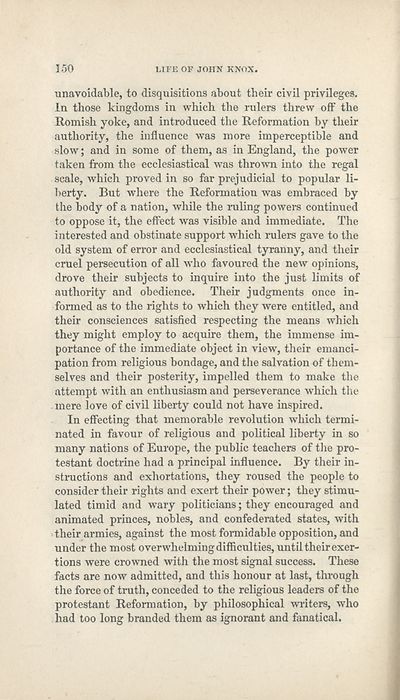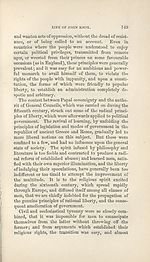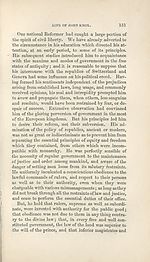Download files
Complete book:
Individual page:
Thumbnail gallery: Grid view | List view

150
E OF JOHN KNOX.
unavoidable, to disquisitions about their civil privileges.
In those kingdoms in which the rulers threw off the
Romish yoke, and introduced the Reformation by their
authority, the influence was more imperceptible and
slow; and in some of them, as in England, the power
taken from the ecclesiastical was thrown into the regal
scale, which proved in so far prejudicial to popular li¬
berty. But where the Reformation was embraced by
the body of a nation, while the ruling powers continued
to oppose it, the effect was visible and immediate. The
interested and obstinate support which rulers gave to the
old system of error and ecclesiastical tyranny, and their
cruel persecution of all who favoured the new opinions,
drove their subjects to inquire into the just limits of
authority and obedience. Their judgments once in¬
formed as to the rights to which they were entitled, and
their consciences satisfied respecting the means which
they might employ to acquire them, the immense im¬
portance of the immediate object in view, their emanci¬
pation from religious bondage, and the salvation of them¬
selves and their posterity, impelled them to make the
attempt with an enthusiasm and perseverance which the
mere love of civil liberty could not have inspired.
In effecting that memorable revolution which termi¬
nated in favour of religious and political liberty in so
many nations of Europe, the public teachers of the pro-
testant doctrine had a principal influence. By their in¬
structions and exhortations, they roused the people to
consider their rights and exert their power; they stimu¬
lated timid and wary politicians; they encouraged and
animated princes, nobles, and confederated states, with
their armies, against the most formidable opposition, and
under the most overwhelming difficulties, until their exer¬
tions were crowned with the most signal success. These
facts are now admitted, and this honour at last, through
the force of truth, conceded to the religious leaders of the
protestant Reformation, by philosophical writers, who
had too long branded them as ignorant and fanatical.
E OF JOHN KNOX.
unavoidable, to disquisitions about their civil privileges.
In those kingdoms in which the rulers threw off the
Romish yoke, and introduced the Reformation by their
authority, the influence was more imperceptible and
slow; and in some of them, as in England, the power
taken from the ecclesiastical was thrown into the regal
scale, which proved in so far prejudicial to popular li¬
berty. But where the Reformation was embraced by
the body of a nation, while the ruling powers continued
to oppose it, the effect was visible and immediate. The
interested and obstinate support which rulers gave to the
old system of error and ecclesiastical tyranny, and their
cruel persecution of all who favoured the new opinions,
drove their subjects to inquire into the just limits of
authority and obedience. Their judgments once in¬
formed as to the rights to which they were entitled, and
their consciences satisfied respecting the means which
they might employ to acquire them, the immense im¬
portance of the immediate object in view, their emanci¬
pation from religious bondage, and the salvation of them¬
selves and their posterity, impelled them to make the
attempt with an enthusiasm and perseverance which the
mere love of civil liberty could not have inspired.
In effecting that memorable revolution which termi¬
nated in favour of religious and political liberty in so
many nations of Europe, the public teachers of the pro-
testant doctrine had a principal influence. By their in¬
structions and exhortations, they roused the people to
consider their rights and exert their power; they stimu¬
lated timid and wary politicians; they encouraged and
animated princes, nobles, and confederated states, with
their armies, against the most formidable opposition, and
under the most overwhelming difficulties, until their exer¬
tions were crowned with the most signal success. These
facts are now admitted, and this honour at last, through
the force of truth, conceded to the religious leaders of the
protestant Reformation, by philosophical writers, who
had too long branded them as ignorant and fanatical.
Set display mode to:
![]() Universal Viewer |
Universal Viewer | ![]() Mirador |
Large image | Transcription
Mirador |
Large image | Transcription
| Antiquarian books of Scotland > Scotland/Scots > Life of John Knox ; and, The life of Alexander Henderson > (168) |
|---|
| Permanent URL | https://digital.nls.uk/131834320 |
|---|
| Description | Thousands of printed books from the Antiquarian Books of Scotland collection which dates from 1641 to the 1980s. The collection consists of 14,800 books which were published in Scotland or have a Scottish connection, e.g. through the author, printer or owner. Subjects covered include sport, education, diseases, adventure, occupations, Jacobites, politics and religion. Among the 29 languages represented are English, Gaelic, Italian, French, Russian and Swedish. |
|---|

